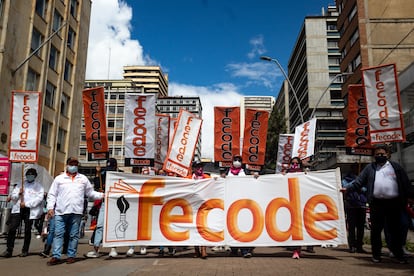Colombia’s Gustavo Petro hit by new campaign finance headache
Authorities are investigating whether $125,000 that the country’s Federation of Education Workers (Fecode) donated to Colombia Humana, the president’s party, were unlawfully used in his 2022 presidential campaign


The noise surrounding the campaign funding that brought Gustavo Petro to the presidency of Colombia is not new. After the leftist leader achieved a historic victory in the 2022 elections, questions arose about the figures he presented to the National Electoral Council (CNE). Until now, the president and members of his campaign have avoided the accusations, but a recent investigation by the Attorney General’s Office once again calls them into question. At the center of the investigation is the Colombian Federation of Education Workers (Fecode), one of the country’s main unions, which provided the resources that are under scrutiny.
The matter revolves around a check for 500 million pesos (about $125,000) written out by Fecode and which allegedly went to Petro’s campaign, which exists as a legal entity. In August of last year, the digital media outlet La Silla Vacía revealed that the union indeed transferred this money, but not to the presidential campaign. Although the purpose of the donation was to support the candidate — this much was confirmed by Fecode officials to the media — the money was given to Colombia Humana, one of the parties that belongs to the Historical Pact, the leftist coalition that endorsed Petro. Colombian law prohibits corporations, associations, societies and foundations from contributing funds to presidential campaigns, and authorities are investigating whether the money was used to finance campaign expenses. The theory about a possible triangulation of resources — that it went through the party in order to evade the law — is at the core of the mess.
The matter got underway on January 22, when officials from the Prosecutor’s Office carried out an inspection at the headquarters of Fecode in Bogotá. Although the investigation went unnoticed by public opinion, two days later the president himself drew attention to what had happened. “The raid of a workers’ organization, seeking paths to remove the president of the Republic from the Presidency. We are not talking about just anything,” he said while visiting the department of Chocó with his ministers. Without mentioning the amount of the contribution to his campaign, Petro criticized the conduct of the Prosecutor’s Office. “I always thought that the raids were against mafia organizations that illegally finance politicians. Now they are against workers’ organizations, because the president is not part of drug trafficking or one of those politicians who allow themselves to be financed by drug trafficking.”
Petro has spoken of legal movements to remove him from office, in what he has described as a “soft coup” or reflections of the so-called lawfare. In late May 2023, he thus described the decisions of state bodies independent from the executive, such as the Prosecutor’s Office, against members of his party for diverse and dissimilar cases. “By the way, have you realized that they are taking away the votes of the lawmakers of the Historical Pact, suspending them with administrative orders? That is, they are de facto changing the political representation in Congress that the people elected. They took away the speakership of Congress from the Pact, and now they are taking away its votes. It is a soft coup,” he wrote on the social media platform X. “It is unfortunate but we are in the same situation as all Latin American countries. They use the Prosecutor’s Office and the Attorney General’s Office to do politics.”
In the case of his campaign funding, his remarks were overshadowed by the findings of the Prosecutor’s Office, which were published by the newspaper El Tiempo. These include records of a meeting of the Fecode executive committee on May 3, 2022, in which officials approved a decision to provide “financial support to the campaign of the candidate Gustavo Petro for the Presidency of Colombia.” Three weeks later, according to another document to which the newspaper had access, the union issued a check for 500 million pesos in the name of Dagoberto Quiroga, representative of Colombia Humana, with the objective of “collaborating with the Petro [presidential] campaign 2022-2026.”
On September 23 of that same year, with Petro already sitting in the president’s office and after the publication by La Silla Vacía of information about the undeclared donation, Quiroga went to a notary’s office to sign a sworn document that contradicted the Fecode files. In that document he made it clear that the union’s contribution was made to “the political party (Colombia Humana movement) but not to the presidential campaign.” Five days later, President Petro appointed Quiroga as superintendent of Home Public Services.
Asked about the discrepancy between the notarized document and Fecode’s records, the superintendent explained that Fecode did in fact try to make a contribution to the campaign, but that it was rejected. It was at that moment that the possibility of donating the money to Colombia Humana arose, he says, to cover operating expenses. “We delayed drawing up the notarized statement because we didn’t agree on dates and we were collecting documents. We accepted the money because this is a young party and needs funds,” he commented. His version coincides with that of Eduardo Noriega, spokesperson for Colombia Humana, who assured El Espectador that “the donation went to the party and not to the campaign.”
The Prosecutor’s Office will continue to investigate the final whereabouts of the money. If its use in the campaign is proven, it would imply that the campaign violated the limits established by law. The accounts in the possession of the CNE indicate that the candidacy of the current president did not exceed the financial limit by 151 million pesos ($37,750) in the first round and 147 million pesos ($36,750) in the second. The 500 million pesos under scrutiny would exceed these two limits and would be added to other possible unreported funds that are under investigation. Last June, Semana magazine revealed recordings of former ambassador Armando Benedetti, in which he stated that he helped obtain 15,000 million pesos ($3.7 million) for the campaign; and in August, in the middle of his judicial process, Nicolás Petro, the president’s eldest son, admitted that irregular money was also used in the race for the presidency. However, weeks later, Nicolás indicated that he had been “pressured” to become “a weapon” against his father.
Sign up for our weekly newsletter to get more English-language news coverage from EL PAÍS USA Edition
Tu suscripción se está usando en otro dispositivo
¿Quieres añadir otro usuario a tu suscripción?
Si continúas leyendo en este dispositivo, no se podrá leer en el otro.
FlechaTu suscripción se está usando en otro dispositivo y solo puedes acceder a EL PAÍS desde un dispositivo a la vez.
Si quieres compartir tu cuenta, cambia tu suscripción a la modalidad Premium, así podrás añadir otro usuario. Cada uno accederá con su propia cuenta de email, lo que os permitirá personalizar vuestra experiencia en EL PAÍS.
¿Tienes una suscripción de empresa? Accede aquí para contratar más cuentas.
En el caso de no saber quién está usando tu cuenta, te recomendamos cambiar tu contraseña aquí.
Si decides continuar compartiendo tu cuenta, este mensaje se mostrará en tu dispositivo y en el de la otra persona que está usando tu cuenta de forma indefinida, afectando a tu experiencia de lectura. Puedes consultar aquí los términos y condiciones de la suscripción digital.








































